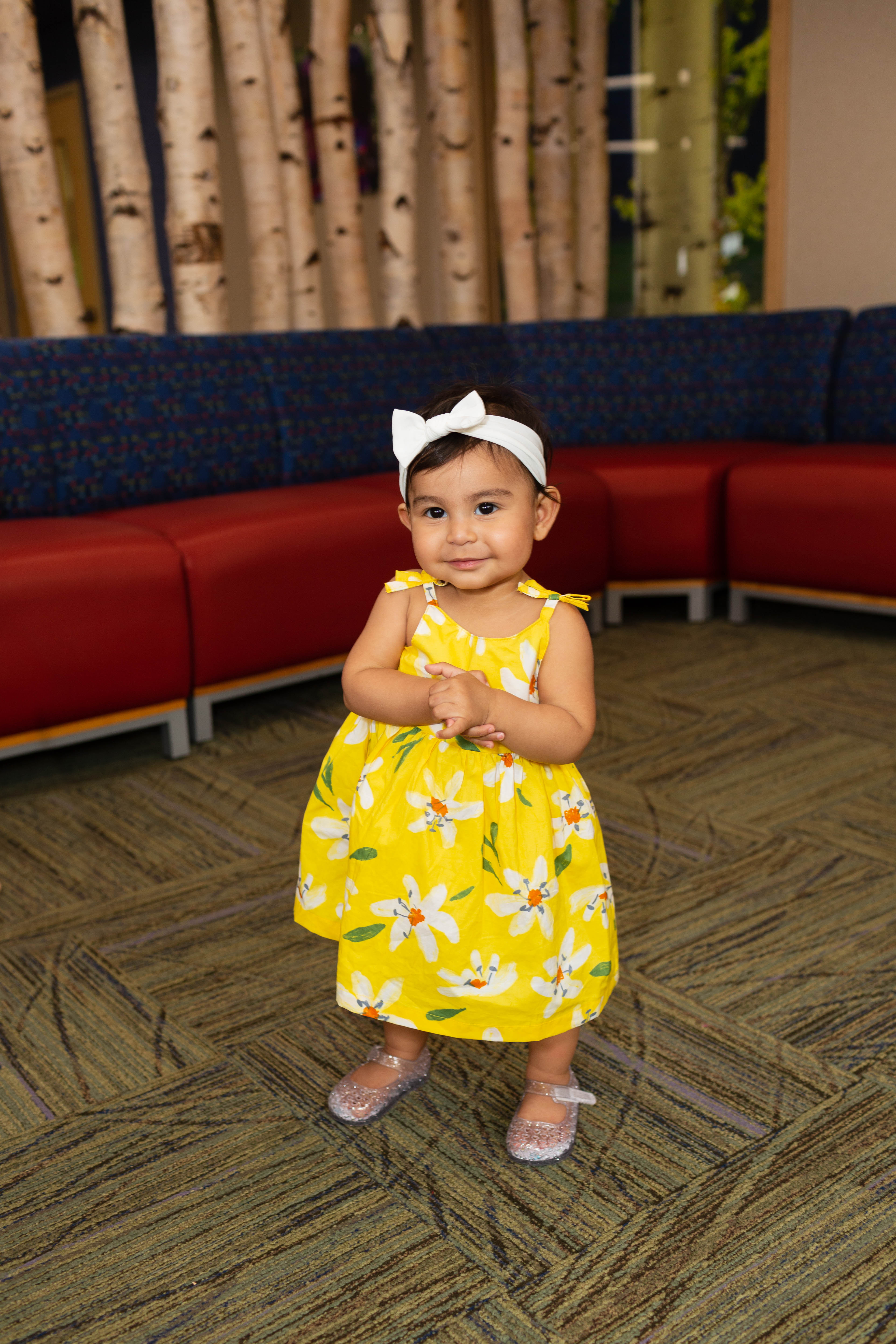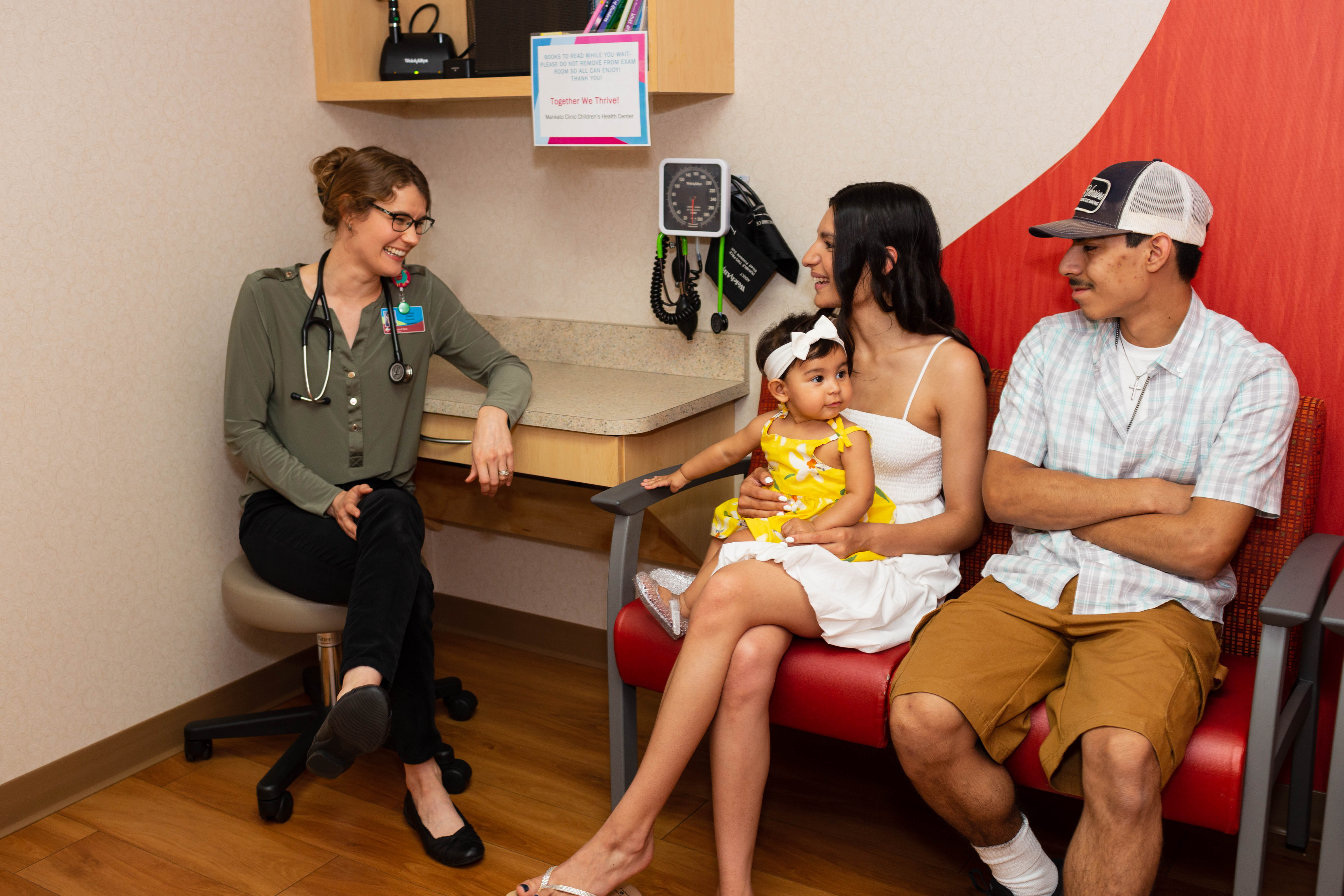
9 minute read
First Steps Helps Babies Get a Good Start
First Steps Helps Babies Get a Good Start
By Marie WoodPhotos By Michelle Isebrand Photography
MEETING THOSE HEALTHY BABIES IS THE BEST PART OF MY JOB!
Before they became teenage parents, Renita Shiwpaul and Angel Martinez were middle school sweethearts. Renita gave birth to their daughter, Ellie, just three days after her 18th birthday. Today, Angel is the sole provider of their family and Renita is thriving as a stay-at-home mom.
Renita was only 17 when she got pregnant, but she wanted to do her very best for their baby. Renita worked six days a week, went to every prenatal appointment, and graduated from high school. Her boyfriend and baby’s father, Angel Martinez, became a U.S. Permanent Resident and got a good job.

Thanks to the First Steps program, Renita and Angel were ready for parenthood.
When Renita came to the Mankato Clinic Obstetrics and Gynecology department for her first prenatal visit, she was connected with Teresa Freitag, First Steps coordinator with Blue Earth County Public Health, who has an office in the Mankato Clinic OB department.
“Teresa was my lifesaver. She held my hand the entire way through,” Renita says.
First Steps, a community initiative and partnership between the Greater Mankato Area United Way, Mankato Clinic Foundation and Blue Earth County, supports healthy pregnancies and healthy babies through age 3. The collaborative connects new and expecting parents to free or low-cost resources.

“I help families navigate medical, county and community resources. With my clients, we focus on getting ready to be a parent. We address insurance, parenting, childcare, housing, daycare, domestic violence, chemical dependency, mental health and access to food. We look at where their life is now and where they want to be when their baby comes,” Teresa says. “There is no judgement. We’re here to walk side-by-side with you throughout your pregnancy.”
Teresa helped Renita renew her insurance and insure her baby for the first year of life. She taught them how to rent an apartment, live on a budget, establish a home and get the resources and supplies they needed for a new baby. Teresa also assisted Angel in becoming a permanent resident and finding employment.
“Utilize the resources that you have. I used to be so scared to speak up and ask for things I need. Just to call, I felt like I was wasting someone’s time. They never make you feel that way ever. Everyone is so nice and so incredibly kind and understanding,” Renita says.
Pregnancy had its physical challenges too. Renita suffered from hyperemesis gravidarum (HD) which causes severe nausea and vomiting. She was exhausted, moody and throwing up. She also had to have her appendix removed during pregnancy.
After a full-term pregnancy under the care of Dr. Ashley Thorson, she delivered a healthy baby girl with Dr. Carla Goerish attending. Ellie turned 1 on June 16, 2024! And Renita and Angel still check in with Teresa.
“Meeting those healthy babies is the best part of my job!” Teresa says.

Baby Days
“I’ve heard young moms not being heard or taken seriously. I’ve never once felt like that. Every concern I have is addressed,” Renita says.
Dr. Amy Deehr, Mankato Clinic physician, is Ellie’s pediatrician. Between well-child visits and illnesses, Renita is a frequent visitor at the Children’s Health Center.
In the spring, Ellie was spiking a fever and miserable with cold symptoms. Before testing Ellie for RSV, COVID and influenza with a nasal swab, they explained the process to Renita. By the time it was over, Dr. Deehr had Ellie laughing and giggling.
“As a first-time mom, I’m a very anxious person. Everyone is so sweet and patient with me,” Renita says. “Dr. Deehr is very good at communicating everything. She’s very thorough and explains things in ways I can understand.”
It’s important for parents to establish a good partnership with their child’s healthcare provider.
“Well-child visits are key to a child’s health and well-being. We check the child’s measurements and make sure they are growing and meeting developmental milestones. It’s also a chance for us to answer the questions that parenting brings. I like to tell parents there are no stupid questions. If you’re thinking it, I want to help answer it,” Dr. Deehr says.

Well-child checks also keep children on schedule with their childhood immunizations, which are recommended by all Mankato Clinic pediatricians.
“I encourage families to ask questions about vaccines. There’s a lot of information out there and it can be hard to sort through and understand.
That’s what your pediatrician is here for,” Dr. Deehr says.
Upon Teresa’s advice, Renita and Ellie also receive home visits from a Blue Earth County public health nurse, a service available to all residents. At monthly visits, the nurse checks Ellie’s weight, tracks milestones, supports breastfeeding and increases confidence. Renita keeps a note on her phone filled with questions for the nurse. The visits are very reassuring.
Being a new and young mom can be a hard road, but Renita says motherhood is the best thing that’s ever happened to her.
“I can see all over her face that she is a happy and independent girl. I can’t wait to see how far she goes in life,” Renita reflects.

“It’s been so incredible watching her hit every milestone –walking and talking. We have that bond and connection that I never could have imagined. I’m so thankful that I’m able to be here and watch it all with my own eyes and help her figure everything out.”
To meet Mankato Clinic pediatric providers, visit mankatoclinic.com/locations/childrens-health-center-mankato
Children's Health Center 1421 Premier Drive, Mankato 507-389-8529
FIRST STEPS
First Steps connects new and expecting parents to free or low-cost services and resources. The program assists parents of children up to age 3. All women who receive healthcare services in the region are welcome.
First Steps is funded by the Greater Mankato Area United Way, Blue Earth County and Mankato Clinic Foundation. Call 507-385-3847


POSTPARTUM DEPRESSION
Many women get the “baby blues” – tearfulness, sadness, mood swings – in the first few weeks postpartum.
Contact your healthcare provider after week 3, if you have feelings of:
• Sadness
• Intense irritability
• Racing thoughts
• Anxiety
• Intrusive thoughts about harm coming to baby
Seek immediate help from your nearest Emergency Department if you have:
• Hallucinations
• Paranoia
• Insomnia (not sleeping)
• Talking rapidly
• Abnormally elevated mood
• Thoughts of harming yourself, baby or others
Depression FOR HELP REACH OUT
Postpartum Depression
“I was constantly in fear that something was going to happen to my baby. If I wasn’t watching her breathing, she would stop. I couldn’t go for a walk because I was afraid a car would hit me. Just hearing Ellie cry sent me into a panic,” Renita says.
When she found herself bawling in her car, she called Mankato Clinic. The nurse told her she was proud of her for calling and promptly got Renita an appointment with Dr. Anna Steffan, a psychiatrist who specializes in maternal mental health.
Renita was suffering from postpartum depression, anxiety, lack of sleep and obsessive-compulsive disorder.
“Postpartum OCD is relatively common in new mothers suffering from postpartum mood and anxiety disorders and can include distressing thoughts of bad things happening to baby which is distinctive from a desire or compulsion to actually harm baby. A lot of mothers feel ashamed or fearful of admitting to having these thoughts,” Dr. Steffan says.
Postpartum depression can make women feel sad, hopeless and anxious. Sometimes, women feel as if they cannot love or care for their baby.
“It is difficult to care for a newborn at the best of times but doing that task when you are mentally unwell feels, and sometimes is, impossible and can interfere with bonding with your child,” Dr. Steffan explains.
In her first appointment, Renita was guarded because she was afraid her baby would be taken away from her. Dr. Steffan gained Renita’s trust and she opened up about her feelings.
“She helped me feel normal. That I’m not alone. I’m not an outcast,” Renita says.
“I try to normalize how common it is to struggle with mental health in the postpartum period from a physiological and psychological perspective,” Dr. Steffan says. “I share that newborn humans are the most delicate and labor-intensive offspring of any mammal and parents are not meant to do it alone. I encourage new moms and their partners to accept help from friends and family. And don’t feel guilty or inferior about it.”
Treatment is based on the type and severity of symptoms and the patient’s medical and psychiatric history.
“Mainstays of treatment are selective serotonin reuptake inhibitors (SSRIs) which are helpful medications for depression, anxiety and obsessive-compulsive symptoms. New treatments that target the hormonal causes of postpartum depression can be very helpful, but sometimes expensive,” Dr. Steffan says. “Many women worry that medications will harm their baby through exposure to breastmilk. I share what is known about exposure to medications for babies and what is known about the risks of untreated mental illness in mothers for babies.”
Renita’s treatment plan combines talk therapy and medication. She sees Alexis Cote-Sands, MSW, LICSW, for talk therapy every other week, more frequently if needed, and regular medication checks with Dr. Steffan. To prevent separation anxiety for both mom and baby, she works one shift a week. Renita also knows it’s good for her to get out of the house and be with other people.
“Therapy helped so much. I know I can’t be as good of a mom as I want to be if I feel like this,” Renita says. “I’m feeling so great now. Reach out when you need help.”
DR. ANNA STEFFANMANKATO CLINICPSYCHIATRIST



